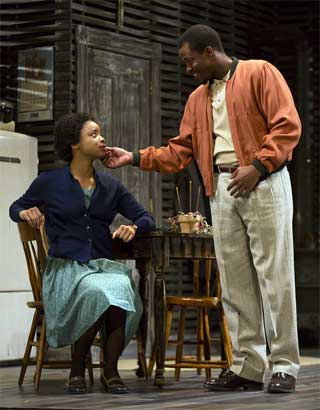Play (1959)
by Lorraine Hansberry
Directed by Liesl Tommy
Huntington Theatre Company
Boston University Theatre
Boston, MA
March 8 – April 7, 2013
Set Design: Clint Ramos, Lighting Design: Lap Chi Chu, Costume Design: Kathleen Geldard, Original Music & Sound Design: Broken Chord
With Ashley Everage (Ruth Younger), Cory Janvier (Travis Younger), LeRoy McClain (Walter Lee Younger), Keona Welch (Beneath Younger), Kimberly Scott (Lena Younger), Jason Bowen (Joseph Asagai), Corey Allen (George Murchison), Will McGarrahan (Karl Lindner), Maurice E. Parent (Bobo)

Jason Bowen as Joseph Asagai
in “A Raisin In The Sun”
Photo: T. Charles Erickson
Courtesy Huntington Theatre Company
Several generations of the Younger family live in a crowded apartment and each, in his or her own way, yearns for a better life. The availability of funds from the deceased Younger patriarch’s life insurance policy enables some dreams to form, but there are complications and clashes involving radically different expectations. A change of venue for the family becomes an option, but racial issues surface, which, along with financial tradeoffs, makes for moral challenges and complicated choices.
This long, but touching, play about the interlaced aspirations of a family is at once uplifting and attenuated. There is a bit of the epic in this survey of the romantic, vocational and geographic yearnings of a multigenerational family during this transitional period for African-Americans. Hopes for advanced education by Beneatha, and for success in business by Walter, mix with the desire to move to a house in a better setting by Ruth, to create a complicated dance for resources and ideals.
Jason Bowen is a real standout as Joseph Asagai, the Nigerian suitor to Beneatha Younger (Keona Welch). His performance is crisp, vivid and entertaining.
Each of the other principals has his or her moment in the sun, calling forth considerable laughter from the audience at different times.
Ashley Everage as the matriarch, Ruth Younger, has more than her share of catchy epithets and carries them off with verve and panache.
Keona Welch gives a strong and evocative performance as Beneatha, whose drive for education is complicated by her attraction to Joseph Asagai’s neo-African romanticism, and by her resistance to George Murchison’s (Corey Allen) more drearily standard pursuits.
The omnipresent and versatile Will McGarrahan plays Karl Lindner, an unsympathetic character who brings a real estate grievance to the family, pulling off officious offensiveness convincingly.
The set is a complicated rotating affair that goes to considerable trouble to showcase all the rooms in the Younger apartment. It struck me as overdone, a bit too noisy and intrusive for what it accomplishes; a simpler static array would likely have worked just as well, without the fanfare or distraction.
Contemporary music introduces the play and the second act, but I am not sure why, given that the 1950s setting is crucial to understanding the plot. It is quite pronounced and seems a bit out of context.
At the beginning of the play, a wall of very bright lights on the back of the stage is glared at the audience for what seems too long a time. Presumably this evokes the eponymous sun, but comes across as unnecessarily intrusive rather than interestingly symbolic.
The play, overall, carries a punch and has an interesting narrative curve. Direction, in general, is somewhat on the melodramatic side, not working towards tautening and economizing the script, which, on its own, runs long.
– BADMan
Leave a Reply